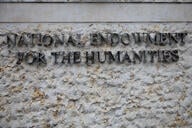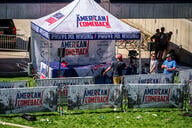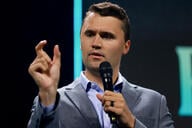You have /5 articles left.
Sign up for a free account or log in.

tzahiV/iStock/Getty Images
In sports competitions, someone has to draft the rules and make critical judgments about their enforcement. Was the runner out or safe at home? Did a defensive player trip the dribbling guard? Should the tush push be banned? So too for the professions: lawyers, physicians, accountants and others. In higher education, the American Association of University Professors for many decades has been the gold standard for impartiality. No more.
In a recent disturbing interview published in Inside Higher Ed, the AAUP’s president, Todd Wolfson, made it unmistakably clear where the organization stands at a time when antisemitism on college campuses is spiking—against both students and Jewish faculty, whom the AAUP purports to represent. A little more than a year after the AAUP reversed its long-standing opposition to academic boycotts, Wolfson, in the interview, called for an end to all U.S. military aid to Israel—defensive or otherwise—and went so far as to characterize Israel’s war in Gaza as “genocide.” The patina of impartiality is gone.
This is the antithesis of academic freedom, the articulated overarching goal of this once-respected organization of university teachers. The AAUP has long claimed to be a guardian of open inquiry among scholars, but an organization cannot support robust dialogue and discourse on contentious topics while simultaneously endorsing politically motivated academic boycotts on the grounds they “can be considered legitimate tactical responses.”
Academic boycotts do not expand learning or produce knowledge. Boycotts aimed at Israeli universities harm Israeli scholars and students—both Jewish and Arab. Ending U.S.-Israel academic collaboration also deprives American students and researchers from opportunities to contribute to the common good.
This all comes at a time when we’re seeing a frightening rise in antisemitism on campuses across the country. According to the Anti-Defamation League, the number of antisemitic incidents on college campuses rose higher last year than at any other location, with an 84 percent increase from the year before.
In the Inside Higher Ed interview, Wolfson dismisses the very real concerns and experiences of Jewish students and faculty by deriding the Title VI investigations into antisemitic harassment as “weaponization of antisemitism.” This characterization gaslights Jews, minimizing the alarms that Jewish communities have raised about discrimination on campus.
Several Jewish organizations, including the ADL, the Academic Engagement Network (which we lead), the American Jewish Committee, the Jewish Federations of North America and Hillel International have previously warned AAUP leadership that it is alienating its Jewish members, marginalizing their voices and undermining trust in higher education. In a joint letter, the groups wrote, “The AAUP [is] being perceived as increasingly moving in a virulently anti-Israel direction, and as a result, growing insensitive and even hostile to the concerns of its Jewish and Zionist members.”
The First Amendment protects not only private expression by individuals but also that of private organizations. Legally, there is nothing to prevent an environmental group from taking a stand on abortion or a civil rights group from opposing aid to Ukraine in its war with Russia. But the further the distance from the core mission of the organization, the more the leadership needs to exercise good judgment and discretion. Otherwise, the members, who came together for other reasons, may be perceived as fully supporting the organization’s pronouncements.
The AAUP should not continue down this path without consequences. If it insists on using its platform to delegitimize Israel and trivialize Jewish concerns over antisemitism as “weaponization,” it will have forfeited its claim to represent all faculty. It will be behaving as a partisan labor union and not the trusted arbiter.



